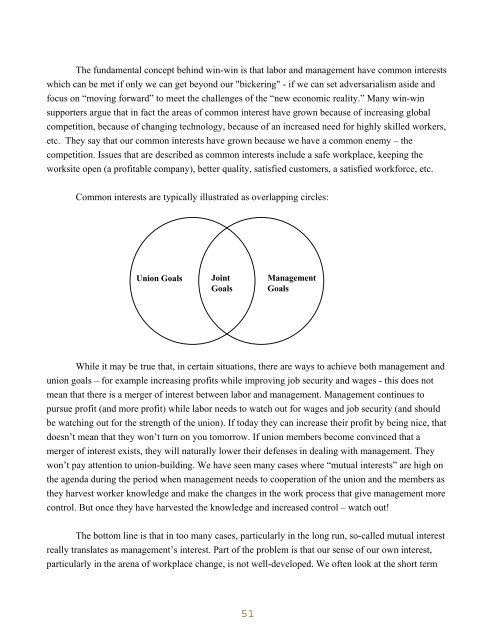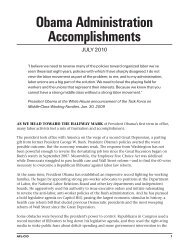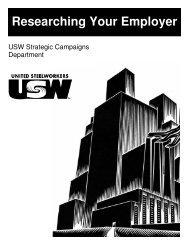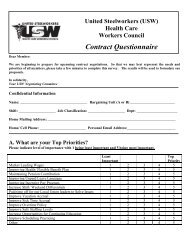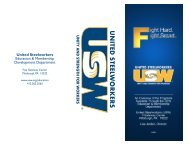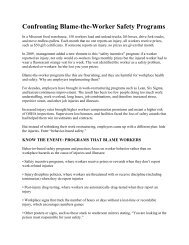Union Approach to Health and Safety: - United Steelworkers
Union Approach to Health and Safety: - United Steelworkers
Union Approach to Health and Safety: - United Steelworkers
Create successful ePaper yourself
Turn your PDF publications into a flip-book with our unique Google optimized e-Paper software.
The fundamental concept behind win-win is that labor <strong>and</strong> management have common interests<br />
which can be met if only we can get beyond our "bickering" - if we can set adversarialism aside <strong>and</strong><br />
focus on “moving forward” <strong>to</strong> meet the challenges of the “new economic reality.” Many win-win<br />
supporters argue that in fact the areas of common interest have grown because of increasing global<br />
competition, because of changing technology, because of an increased need for highly skilled workers,<br />
etc. They say that our common interests have grown because we have a common enemy – the<br />
competition. Issues that are described as common interests include a safe workplace, keeping the<br />
worksite open (a profitable company), better quality, satisfied cus<strong>to</strong>mers, a satisfied workforce, etc.<br />
Common interests are typically illustrated as overlapping circles:<br />
<strong>Union</strong> Goals<br />
Joint<br />
Goals<br />
Management<br />
Goals<br />
While it may be true that, in certain situations, there are ways <strong>to</strong> achieve both management <strong>and</strong><br />
union goals – for example increasing profits while improving job security <strong>and</strong> wages - this does not<br />
mean that there is a merger of interest between labor <strong>and</strong> management. Management continues <strong>to</strong><br />
pursue profit (<strong>and</strong> more profit) while labor needs <strong>to</strong> watch out for wages <strong>and</strong> job security (<strong>and</strong> should<br />
be watching out for the strength of the union). If <strong>to</strong>day they can increase their profit by being nice, that<br />
doesn’t mean that they won’t turn on you <strong>to</strong>morrow. If union members become convinced that a<br />
merger of interest exists, they will naturally lower their defenses in dealing with management. They<br />
won’t pay attention <strong>to</strong> union-building. We have seen many cases where “mutual interests” are high on<br />
the agenda during the period when management needs <strong>to</strong> cooperation of the union <strong>and</strong> the members as<br />
they harvest worker knowledge <strong>and</strong> make the changes in the work process that give management more<br />
control. But once they have harvested the knowledge <strong>and</strong> increased control – watch out!<br />
The bot<strong>to</strong>m line is that in <strong>to</strong>o many cases, particularly in the long run, so-called mutual interest<br />
really translates as management’s interest. Part of the problem is that our sense of our own interest,<br />
particularly in the arena of workplace change, is not well-developed. We often look at the short term


